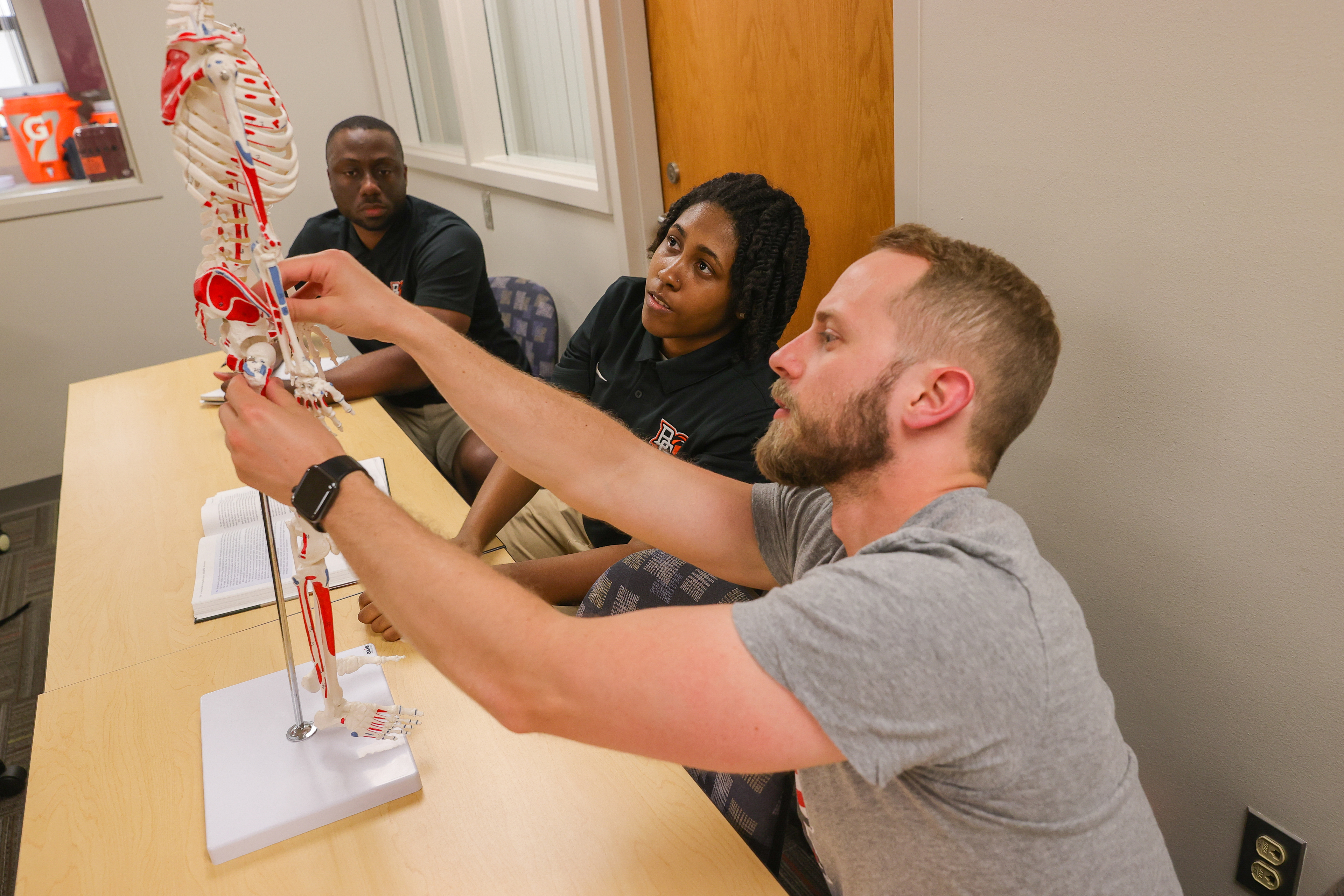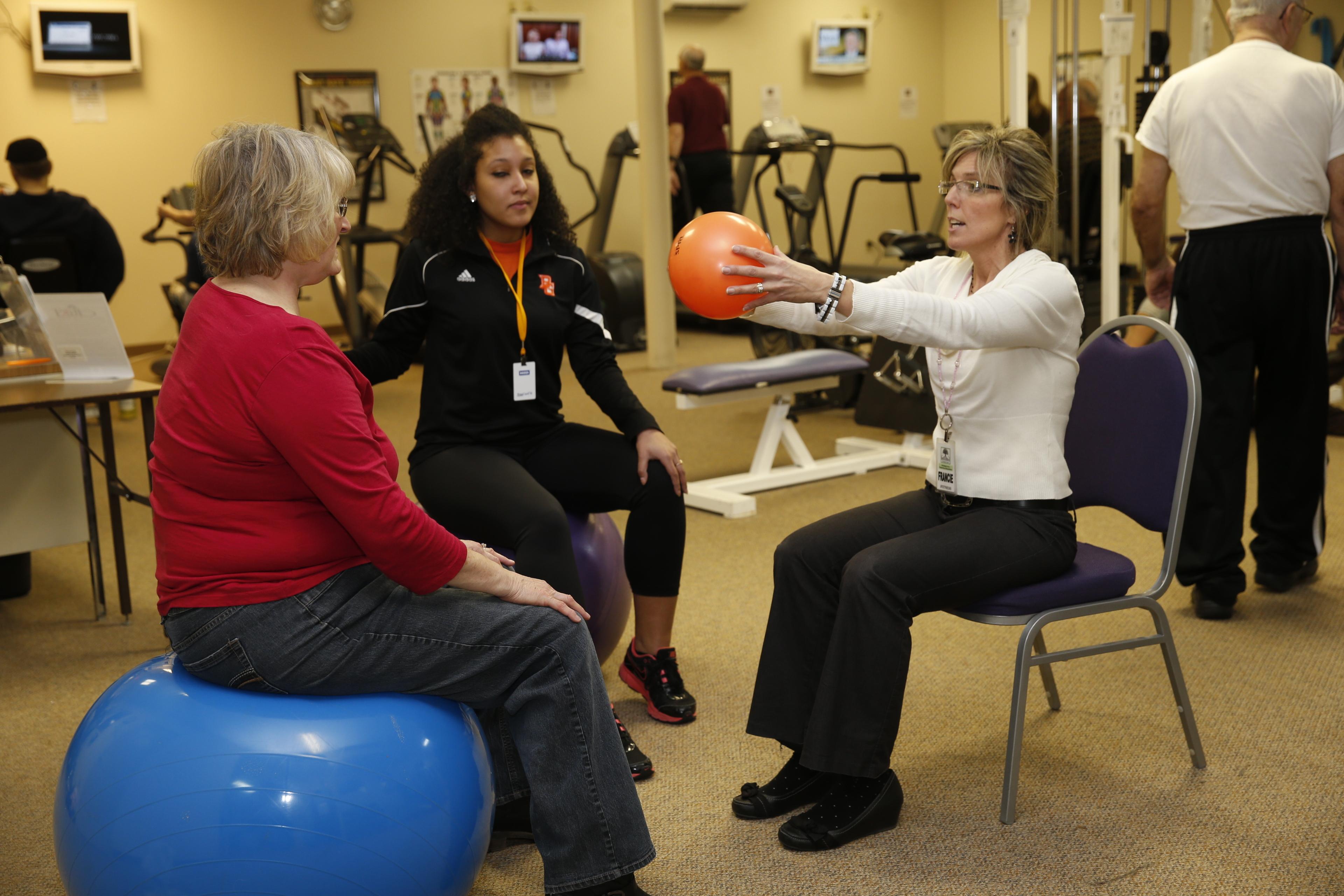Nationally recognized for student experience
The Wall Street Journal

Pre-Occupational Therapy
If you're interested in healthcare but prefer a holistic approach that focuses on helping people manage daily activities, then occupational therapy – or OT – could be a rewarding path for you.
Pre-occupational therapy is a pre-professional track at BGSU. Choosing this track is a great way to make sure you’re ready to apply to a Doctor of Occupational Therapy (OTD) program after earning your bachelor’s degree.
Occupational therapists empower people to regain independence by focusing on the "occupational" or meaningful activities in a person's life – eating, bathing and other essential daily tasks. They help people of all ages avoid and recover from physical, emotional and social issues.
This allied health career requires a doctoral degree, a certification exam and a state license to practice.
BGSU offers a supportive, challenging environment to prepare you for the rigors of OT school. Pre-OT students not only take the classes required to be admitted to occupational therapy school, but also have a major in a specific subject area.
BGSU offers an OTD program if you want to continue your doctoral studies here.
Want more information?
Emma Pennington
Coordinator of Recruitment and Outreach
419-372-6805
eleader@bgsu.edu
Why choose to be a pre-occupational therapy student at BGSU in Ohio?
Acceptance into an OTD program is highly competitive. Our job is to help you meet the requirements and build a strong application. The earlier you prepare, the better chance you have to be accepted into the school of your choice.
By declaring as a pre-OT student, you will have immediate access to the Office of Pre-Professional Programs. We are here for you from freshman orientation to graduation to help you make informed decisions about your path forward.
- Exceptional pre-OT advising. BGSU stands out for its culture of support and personalized guidance. We know what professional schools are looking for in future occupational therapists and can help you develop those skills and qualities.
- A strong academic foundation. We know the prerequisites to take, the GPA you need and all you must do to prepare academically for OT school. We offer you the support and tools you need to succeed.
- Mentorship, alumni and peer connections. Peer ambassadors offer a first level of support. You also will have many opportunities to shadow and hear from professionals in the occupational therapy field. These relationships are invaluable as you explore career options.
- Hands-on opportunities. OT schools like well-rounded students. BGSU offers many student organizations and other ways for you to volunteer, be a leader and cultivate those credentials. Our Center for Undergraduate Research can help you find research opportunities as early as your freshman year.
- Application help. We help you navigate the rigorous application process to OT school.
- Easy transition. You won't need to go far for a graduate occupational therapy program. BGSU has an OTD program.
- Excellent value. BGSU offers a high-quality, affordable education and generous scholarships.
- Proven success. Our graduates are well prepared and regularly accepted into outstanding occupational therapy graduate schools.
- Natural and Health Science Learning Community. Live with other students pursuing health-related majors. The extra academic support you receive in the community is a significant advantage for gaining admission to medical programs.
#1 public university in Ohio for career prep
The Wall Street Journal
Why choose a career as an occupational therapist?
A career as an occupational therapist is a great fit for someone who is compassionate, creative and enjoys helping people overcome challenges and live more fulfilling lives.
- Make a difference. Witnessing someone regain independence, manage daily tasks and return to activities they love is incredibly rewarding.
- Creative problem solving. No two clients are the same. You'll use your creativity to develop personalized therapy plans.
- Varied work settings and clients. OTs work with a wide range of clients, from infants with developmental delays to older adults recovering from strokes. You could work in hospitals, rehab centers, schools, clinics or even people's homes.
- Growing demand and job security. The demand for OTs is high. This translates to stable career opportunities with competitive salaries.
- Focus on prevention and wellness. Occupational therapy goes beyond rehabilitation. OTs promote healthy habits and prevent occupational injuries.
- Dozens of specialties. Qualified OTs can add specialized skills to their practice – environmental modification, assistive technology, aqua therapy, equine therapy, autism, brain injuries, driving and feeding, and eating and swallowing.
After certification, about half of occupational therapists work in dedicated OT practice offices or hospital OT departments. The others typically work in schools, nursing homes and home health services.
Career paths
- Assistive technology trainer
- Early intervention occupational therapist
- Industrial rehabilitation consultant
- Pediatric occupational therapist
- Staff occupational therapist
- Researcher
- Consultant occupational therapist
Quick Facts from the Bureau of Labor Statistics
Curriculum
Coursework for pre-occupational therapy students varies by major. It’s important to work with your academic advisor and the Office of Pre-Professional Programs to make sure you complete the prerequisites you need to apply to OTD programs.
Students are responsible for verifying all prerequisite courses with the occupational therapy school of their choice. Typically, occupational therapy school admissions committees require these courses. (The equivalent BGSU courses are indicated in parentheses.)
Required Courses
- One year of English
- General biology (BIOL 2040/2050)
- Anatomy and physiology (BIOL 3310/3320)
- General physics (PHYS 2010)
- General psychology (PSYC 1010)
- Lifespan (PSYC 3100)
- Abnormal psychology (PSYC 4050)
- General sociology (SOC 1010)
- Medical terminology (AHS 3010)
- Statistics (MATH 1150 or PSYC 2700)

Sample courses
- Communication Strategies
- Ethnicity and Aging
- Motor Learning and Development
- Exercise Physiology
- Biomechanics
- Management
- Health Care Law
- Anatomy and Physiology
#1 university in Ohio – big or small, public or private – students would choose again
The Wall Street Journal
What OTD schools are looking for
- A solid GPA
- A good test score on the GRE
- Well-rounded candidates
- A demonstrated commitment to the OT profession. Participation in undergraduate research is one way to show commitment to moving occupational therapy forward. The BGSU Center for Undergraduate Research program helps you participate in research in year one. Some students have published papers or presented posters at conferences before they graduate.
Request Information
Accreditation
Bowling Green State University [BGSU] is accredited by the Higher Learning Commission. BGSU has been accredited by the Higher Learning Commission since 01/01/1916. The most recent reaffirmation of accreditation was received in 2022-2023, with our next reaffirmation of accreditation scheduled for 2032-2033. Questions should be directed to the Office of Institutional Effectiveness.
Updated: 11/25/2025 01:18PM

